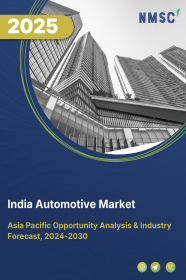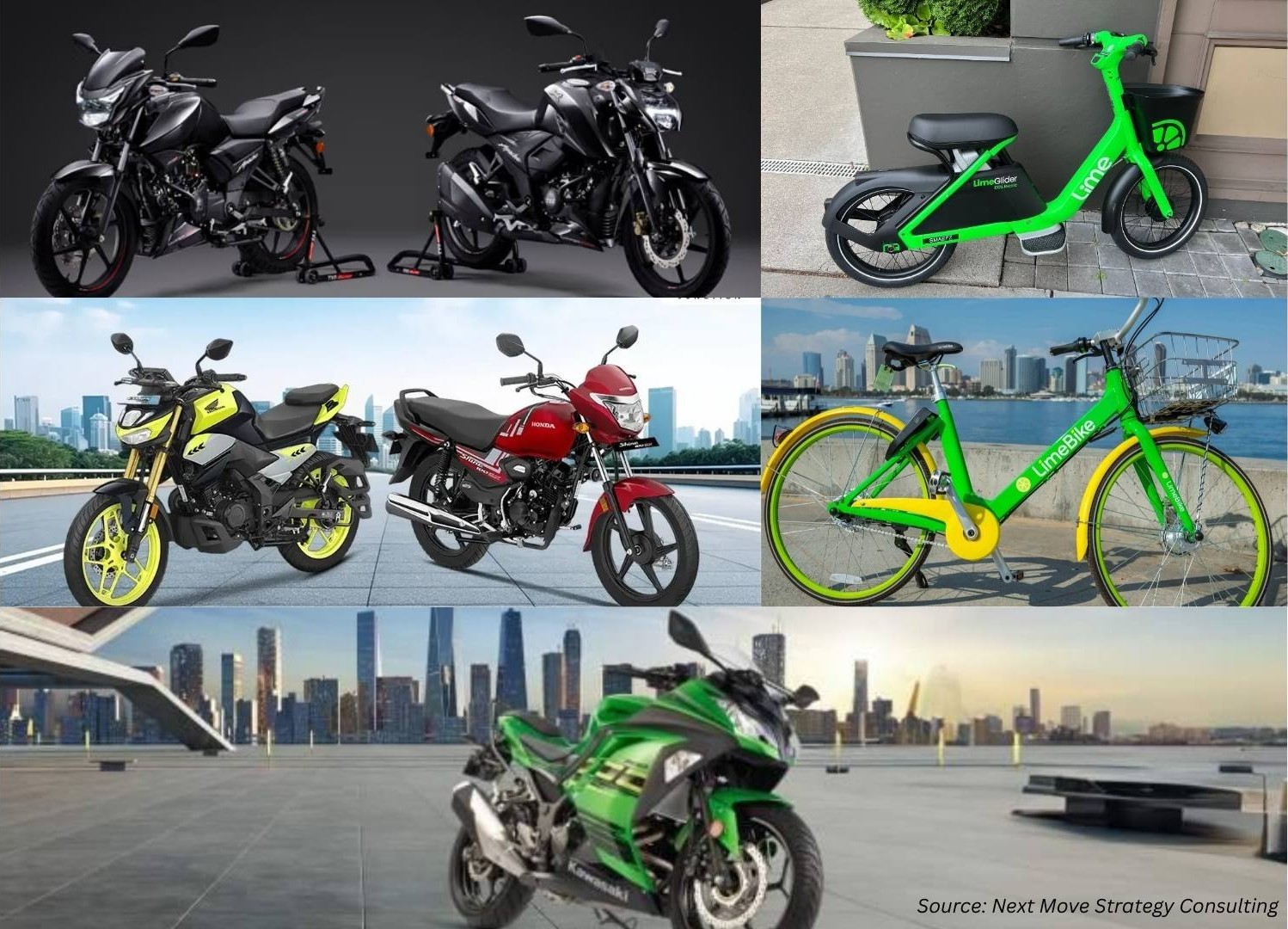
India Automotive Market by Vehicle Type (Passenger Vehicle, Commercial Vehicle, Two Wheelers, and Three Wheelers), by Fuel Type (Petrol, Diesel, Compressed Natural Gas (CNG), Hybrid, and Electric), and by Price (Low Range, Mid-Range, and High Range) – Global Opportunity Analysis and Industry Forecast 2024-2030
India Automotive Market Overview
The India Automotive Market size was valued at USD 113.83 billion in 2023 and is predicted to reach USD 196.46 billion by 2030 with a CAGR of 8.1% from 2024-2030. The India automotive market is a diverse and rapidly evolving sector and it is the world's third-largest automobile market that includes passenger vehicles, commercial vehicles, two-wheelers, and three-wheelers. It is characterized by a wide range of vehicle type driven by economic factors, urbanization, and industrialization with significant technological advancements and government regulations that is shaping the automotive industry. The key trends in Indian automotive sector includes a shift towards electric vehicles, the rise of shared mobility services, digital transformation in sales and services, and the increasing demand from rural areas. The automotive market plays a crucial role to boost the country's economy with its dynamic nature and potentiality for innovation and expansion.
Market Dynamics and Trends
The India automotive market is driven by key government initiatives such as "Make in India" and the Faster Adoption and Manufacturing of Electric (FAME) scheme. The first scheme boosts domestic manufacturing with incentives, while FAME promotes electric vehicle adoption through subsidies and infrastructure development. As per NITI Aayog report 2023, India's EV market is expected to grow at CAGR of 49% from 2022 to 2030. India's EV market growth is driving manufacturing, innovation, supply chain development, job creation, and charging infrastructure in the automotive industry.
Moreover, there is a growing preference for sports utility vehicle (SUVs) and crossovers due to their perceived safety, space, and versatility, consumers are becoming more brand-conscious and it is driving the demand for premium and luxury vehicles in India automotive market. As per the Maruti Suzuki India (MSIL), the SUV segment’s market share in the total Indian passenger vehicle increased, from 40.1% in 2022 to 43% in 2023, and surging further to reach 50.4% in the fiscal year 2024. The SUV segment's growth is driving advancements and expansion in the Indian automotive industry.
Additionally, India's growing economy boosts consumer spending power, leading to higher demand for automobiles. The expanding middle class with increased disposable income is driving the purchase of personal vehicles and it is fueling the growth of the automotive sector in India. According to the Government of India, India's gross disposable income grew by 15% during 2022-23.
However, the dependency upon imported components such as electronic control units (ECUs), engines, transmissions are hindering the India automotive market growth. On the contrary, the growing emphasis on domestic vehicle production by the Indian automotive manufacturers creating ample growth opportunity for the India Automotive market demand in the coming years. For example, in January 2024, the total production of passenger vehicles, three-wheelers, two-wheelers, and quadricycles increased by 23% in India 2024 as compared to December 2023.
Market Segmentation and Scope of The Study
India automotive market report is divided on the basis of vehicle type, fuel type, price, and usage. On the basis of vehicle type, the market is divided into passenger vehicle, commercial vehicle, two wheelers, and three wheelers. The passenger vehicle segment is again divided into, Hatchbacks, Sedans, SUVs, and MPVs. The commercial vehicle is again divided into trucks, and busses. On the basis of fuel type, the market is divided into petrol, diesel, compressed natural gas (CNG), hybrid, and electric. On the basis of price, the market is divided into low range, mid-range, and high range.
Competitive Landscape
Various players in the Indian automotive industry includes Maruti Suzuki India Ltd, Hyundai Motor India Ltd, Tata Motors Ltd, Mahindra & Mahindra Ltd, Kia India Pvt Ltd, Toyota Kirloskar Motor Pvt Ltd, Renault India Private Limited, Skoda Auto Volkswagen India Private Limited, Hero MotoCorp Ltd, TVS Motor Company Ltd, Bajaj Auto Ltd, Eicher Motors Ltd, Yamaha Motor India Pvt Ltd, Ola Electric Mobility Pvt Ltd, ther Energy Pvt Ltd, Ashok Leyland Ltd, Daimler India Commercial Vehicles Pvt Ltd, Force Motors Ltd, Volvo Buses India Pvt Ltd, Greaves Electric Mobility Pvt Ltd, and others. These market players are opting various strategies such as product launches and business expansion to maintain their dominance in the Indian automotive industry.
For instance, Maruti Suzuki inaugurated India’s largest in-plant rail terminal at Manesar, part of the Haryana Orbital Rail Corridor, enabling direct loading of cars onto trains—handling up to 450 k vehicles/year. It plans to shift 35% of car dispatches to rail by FY 2030–31, reducing ~175,000 t CO₂ and 60 million liters of fuel annually.
Moreover, in January 2024, Hyundai announced to launch its first locally produced EV model, the Hyundai Creta EV, in early 2025 to establish itself as a leading global EV brand in the Indian market.
Also, Ola Electric Mobility Pvt Ltd. revealed prototype of first electric motorcycle, Roadster, with plans to launch in three variants in 2025 and even announced expansion into electric three-wheelers later in 2024.
Key Benefits
-
The report provides quantitative analysis and estimations of the market from 2024 to 2030, which assists in identifying the prevailing market opportunities.
-
The study comprises a deep-dive analysis of the current and future India automotive market trends to depict prevalent investment pockets in the market.
-
Information related to key drivers, restraints, and opportunities and their impact on the market is provided in the report.
-
Competitive analysis of the players, along with their market share is provided in the report.
-
SWOT analysis and Porters Five Forces model is elaborated in the study.
-
Value chain analysis in the market study provides a clear picture of roles of stakeholders.
India Automotive Market Key Segments
By Vehicle Type
-
Passenger vehicle
-
Hatchbacks
-
Sedans
-
SUVs
-
MPVs
-
-
Commercial vehicle
-
Trucks
-
Bus
-
-
Two wheelers
-
Three wheelers
By Fuel Type
-
Petrol
-
Diesel
-
Compressed natural gas (CNG)
-
Hybrid
-
Electric
By Price
-
Low range
-
Mid-range
-
High range
Key Players
-
Maruti Suzuki India Ltd
-
Hyundai Motor India Ltd
-
Tata Motors Ltd
-
Mahindra & Mahindra Ltd
-
Kia India Pvt Ltd
-
Toyota Kirloskar Motor Pvt Ltd
-
Renault India Private Limited
-
Skoda Auto Volkswagen India Private Limited
-
Hero MotoCorp Ltd
-
TVS Motor Company Ltd
-
Bajaj Auto Ltd
-
Eicher Motors Ltd
-
Yamaha Motor India Pvt Ltd
-
Ola Electric Mobility Pvt Ltd
-
Ather Energy Pvt Ltd
-
Ashok Leyland Ltd
-
Daimler India Commercial Vehicles Pvt Ltd
-
Force Motors Ltd
-
Volvo Buses India Pvt Ltd
-
Greaves Electric Mobility Pvt Ltd
REPORT SCOPE AND SEGMENTATION:
|
Parameters |
Details |
|
Market Size in 2023 |
USD 113.83 Billion |
|
Revenue Forecast in 2030 |
USD 196.46 Billion |
|
Growth Rate |
CAGR of 8.1% from 2024 to 2030 |
|
Analysis Period |
2023–2030 |
|
Base Year Considered |
2023 |
|
Forecast Period |
2024–2030 |
|
Market Size Estimation |
Billion (USD) |
|
Growth Factors |
|
|
Countries Covered |
28 |
|
Companies Profiled |
15 |
|
Market Share |
Available for 10 companies |
|
Customization Scope |
Free customization (equivalent to up to 80 working hours of analysts) after purchase. Addition or alteration to country, regional, and segment scope. |
|
Pricing and Purchase Options |
Avail customized purchase options to meet your exact research needs. |




















 Speak to Our Analyst
Speak to Our Analyst

























